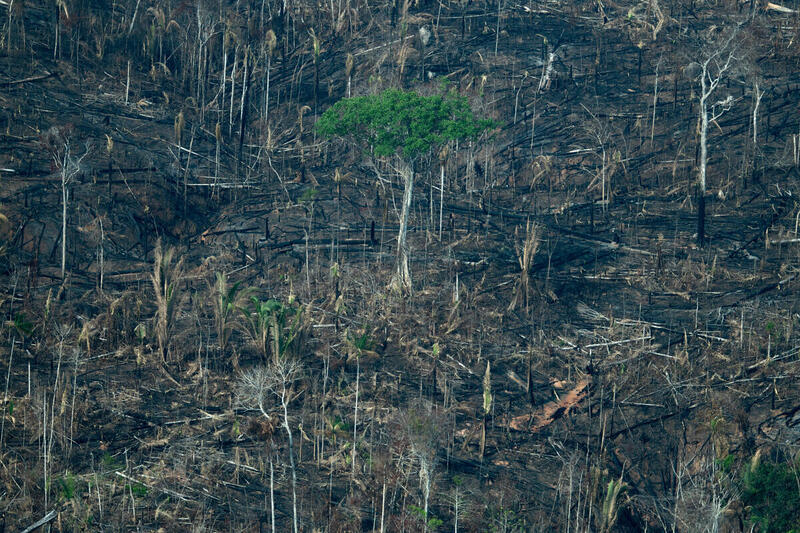Pressure is mounting for a vote in the last weeks of 2021 on bills that weaken environmental licensing rules and legalize land grabbing.
We reach the end of 2021 with the highest deforestation rate in the Amazon in the last 15 years: 13,235 km². It is a shameful and criminal number of forest loss that requires a strong reaction from political leaders. But instead, some of them have encouraged the devastation of our environmental heritage. They promise to press in the last weeks of the year to approve a great Christmas combo of destruction: legalization of public land theft together with a license to deforest, with the voting of the licensing bill (number 2.159/2021) and the land-grabbing bill (numbers 2633/2020 and 510/2021).
The Environmental Permitting Bill, approved by the Chamber of Deputies last August, currently awaits assessment and decision by the Senate. The proposal distorts the purpose of this fundamental instrument in environmental law by making licensing practically an exception. Moreover, those who wrote the text must have thought of an alternative reality in which Brazil would have a robust environmental management structure, with sufficient human and financial resources in governmental agencies. This situation is quite the opposite of what we experience. But the bill proposes mechanisms that place great weight on federal and state environmental inspections capacity while loosening or eliminating the preliminary analysis of business activities.
The proposal distorts the purpose of this fundamental instrument in environmental law by making licensing practically an exception.
For example, the bill establishes a “Permit by Adhesion and Commitment” for activities without significant environmental impact. In these cases, a statement of the business’ characteristics would be enough to automatically issue the license without prior evaluation by the environmental agency. To avoid severe ecological damages in such situations, the agencies need a more sturdy and faster inspection capacity to detect problems once the licenses are issued. In addition, they would need to be agile in applying sanctions to environmental offenders.
The bill also prohibits the agencies from requiring measures to reduce the ecological damage caused by third parties (i.e., caused by someone who is not responsible for the licensed activities) and in situations when the government has police power. Such a proposal has one of the most significant impacts on the Amazon region.
The installation of a new and large project in the Amazon attracts several situations with substantial environmental impacts indirectly caused by the business activity itself. One of the most emblematic recent cases is the Belo Monte Dam in Altamira, Pará state. This project attracted migration, land speculation, deforestation, and numerous social problems. The existing governmental structure was insufficient to deal with the uncontrolled growth of the region. If the current text of the licensing bill is approved, it would not be possible to demand measures to strengthen environmental agencies in similar situations. In other words, the legislative proposal assumes a Brazil in which the installed environmental police power is sufficient, even if the new business activity requesting the license triples the demand over the government.
If the current text of the licensing bill is approved, it would not be possible to demand measures to strengthen environmental agencies in similar situations.
The Socioenvironmental Institute and the Federal University of Minas Gerais estimated the impact of the licensing bill on the paving of the BR-319 highway in Amazonas state, one of the projects that would benefit from the new rule. The loosening of the legislation combined with the existing scenario of low environmental governance would result in accumulated deforestation of 170 thousand km² by 2050 in the state. This number is four times higher than projected deforestation based on the historical average for the region.
And as mentioned at the beginning of the text, we are facing a Christmas combo of destruction: the license to deforest is one of the elements. The other is the legalization of land grabbing. It is also up to the Senate to decide on two bills to change the federal law on land tenure regularization. The intention is to loosen the law by waiving, for instance, governmental inspections on medium and large land parcels before the land title is issued. Such a removal increases the risk of titling areas with land conflicts or under occupation by people paid to watch over the property for those who do not meet the requirements for receiving land titles.
In addition, the bills allow the federal government to issue a land title for areas recently deforested – and even those illegally occupied in the future. The text released on December 8 by Senator Carlos Favaro, rapporteur of these bills, proposes to grant amnesty to public areas invaded unlawfully between 2011 and 2017, donating or selling the parcels directly for their current landholders. Lands occupied after this date, and even in the future, could receive a land title via a bidding process. However, the government would define the rules of this eventual bidding process by presidential decree. Thus, the criteria for this land sale process could benefit the invaders and environmental criminals. If approved, these changes will be a recipe for the expansion of deforestation by those expecting to obtain public land.
It may be hard to think of a Christmas present that would please even more those who destroy our environmental heritage. But we must remember that the legislative process allows last-minute changes in the bills, risking making the texts even worse.
For this reason, the necessary and immediate action of the political leaderships genuinely committed to the combat of deforestation in the Amazon must be to prevent the voting of the bills that weaken environmental licensing and legalize land grabbing.
The opinions expressed in this article are the writer’s own.



